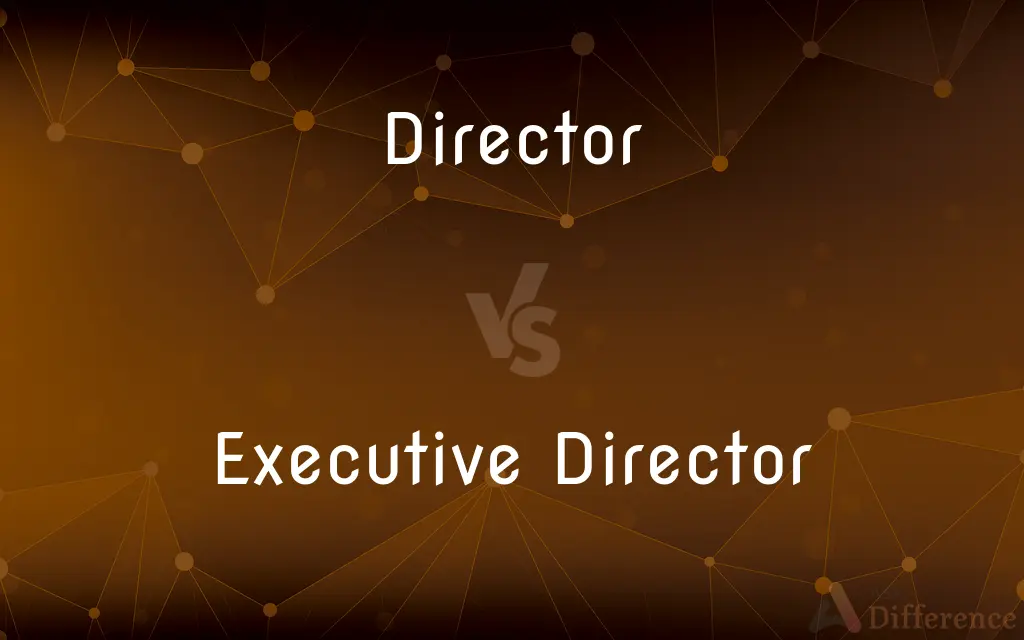Director vs. Executive Director — What's the Difference?
By Tayyaba Rehman — Published on October 23, 2023
Director is a leadership role responsible for managing specific areas or departments of a company. Executive Director is a higher-ranking leadership position, often managing entire organizations and reporting to the board.

Difference Between Director and Executive Director
Table of Contents
ADVERTISEMENT
Key Differences
A Director is typically responsible for overseeing a particular department or unit within an organization. Conversely, an Executive Director typically oversees the entirety of an operation, providing direction and management across departments.
In many corporations, a Director has a specific focus, such as finance, marketing, or operations. An Executive Director, however, generally has a broader organizational role, overseeing all facets and functions of the entity.
A Director usually reports to a higher executive or sometimes to the Executive Director. On the other hand, an Executive Director usually reports directly to the board of directors and holds significant decision-making power across the organization.
Directors might have less strategic responsibility than Executive Directors, focusing more on tactical and operational management. Executive Directors often shape and enforce organizational strategy, managing directors across different departments.
The scope of influence of a Director is often limited to their department or unit. In contrast, an Executive Director's scope is usually organizational-wide, influencing all departments and often engaging with external stakeholders.
ADVERTISEMENT
Comparison Chart
Management Scope
Manages specific departments or units
Manages entire organizations
Reporting Line
Reports to higher executive level
Often reports to the board of directors
Responsibilities
More operational and tactical
Strategic and operational
External Roles
Limited external stakeholder engagement
Engages with external stakeholders
Decision-making
May have limited decision-making power
Typically has broad decision-making authority
Compare with Definitions
Director
A board member of a company or organization.
The Director proposed a new sustainability initiative.
Executive Director
A person who oversees the entire operations of an organization.
The Executive Director proposed a new strategic vision for the company.
Director
A person appointed to conduct and manage a choir or orchestra.
The Director led the orchestra to a standing ovation.
Executive Director
A high-ranking manager who reports to the board of directors.
The Executive Director presented the annual report to the board.
Director
A person leading a department within an organization.
The Director of Marketing launched a successful ad campaign.
Executive Director
An individual who represents an organization to its stakeholders.
The Executive Director addressed community concerns at the meeting.
Director
One that supervises, controls, or manages.
Executive Director
A chief officer who manages various department heads.
The Executive Director held a meeting to discuss quarterly results.
Director
A member of a group of persons chosen to control or govern the affairs of an institution or corporation.
Executive Director
A leader who helps shape and enforce organizational strategy.
The Executive Director introduced new policies to enhance employee well-being.
Director
A person who supervises the creative aspects of a dramatic production or film and instructs the actors and crew.
Director
The conductor of an orchestra or chorus.
Director
An electronic device that continually calculates and displays information used for firing weapons at moving targets, such as missiles or aircraft.
Director
One who directs; the person in charge of managing a department or directorate (e.g., director of engineering), project, or production (as in a show or film, e.g., film director).
Director
A member of a board of directors.
Director
A counselor, confessor, or spiritual guide.
Director
That which directs or orientates something.
Director
(military) A device that displays graphical information concerning the targets of a weapons system in real time.
Director
(chemistry) The common axis of symmetry of the molecules of a liquid crystal.
Director
One who, or that which, directs; one who regulates, guides, or orders; a manager or superintendent.
In all affairs thou sole director.
Director
One of a body of persons appointed to manage the affairs of a company or corporation; as, the directors of a bank, insurance company, or railroad company.
What made directors cheat in South-Sea year?
Director
A part of a machine or instrument which directs its motion or action.
Director
A slender grooved instrument upon which a knife is made to slide when it is wished to limit the extent of motion of the latter, or prevent its injuring the parts beneath.
Director
Someone who controls resources and expenditures
Director
Member of a board of directors
Director
Someone who supervises the actors and directs the action in the production of a show
Director
The person who leads a musical group
Director
An individual responsible for managing and guiding a film or play.
The Director created a breathtaking cinematic experience.
Director
A person who supervises a particular area or activity.
The Director of the summer camp ensured safety for all participants.
Common Curiosities
Who does an Executive Director report to?
An Executive Director typically reports to the board of directors.
Can a Director make strategic decisions?
A Director may participate in strategic planning but often has a more tactical role.
What is a Director’s primary role?
A Director primarily manages specific departments or units within an organization.
What are the responsibilities of an Executive Director?
An Executive Director oversees entire organizations, shaping strategy, and managing department heads.
Can a Director be a member of the board?
Yes, a Director can be a board member, but not all directors automatically have a seat on the board.
Does the Executive Director have a role in hiring Directors?
Yes, typically, an Executive Director is involved in hiring Directors as they oversee various departments.
What is the typical career path to become an Executive Director?
Often, an Executive Director has climbed the corporate ladder, possibly serving as a Director in various departments before ascending.
What is the difference in the responsibility of a Director in non-profit vs. a for-profit organization?
In both sectors, Directors manage specific areas but may deal with different regulatory, fundraising, and financial contexts.
Does a Director have the authority to make company-wide decisions?
Generally, a Director makes decisions specific to their department or unit, not company-wide.
What skills are important for a Director in an organization?
Directors need leadership, management, communication, and expertise in their specific domain.
How does the role of an Executive Director differ in non-profit and for-profit organizations?
While they lead in both contexts, non-profit Executive Directors often focus more on fundraising and compliance with charitable regulations.
Can a company have multiple Directors?
Yes, companies often have multiple Directors, each overseeing a specific department or function.
Is an Executive Director higher than a Managing Director?
This can depend on the organizational structure, but generally, an Executive Director may hold a higher or equivalent rank to a Managing Director.
Is an Executive Director usually involved in daily operations?
Executive Directors can be involved in daily operations, especially in smaller organizations, while in larger ones, they may focus more on strategy and external relations.
How does an Executive Director interact with stakeholders?
Executive Directors often engage with stakeholders to communicate company policies, strategies, and performances.
Share Your Discovery

Previous Comparison
Cheesecake vs. Cream Cheese
Next Comparison
Malaise vs. DiscomfortAuthor Spotlight
Written by
Tayyaba RehmanTayyaba Rehman is a distinguished writer, currently serving as a primary contributor to askdifference.com. As a researcher in semantics and etymology, Tayyaba's passion for the complexity of languages and their distinctions has found a perfect home on the platform. Tayyaba delves into the intricacies of language, distinguishing between commonly confused words and phrases, thereby providing clarity for readers worldwide.














































